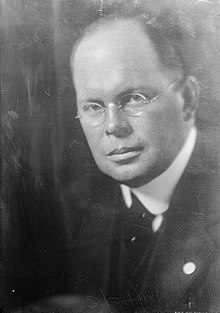Samuel Merwin
Samuel Merwin ; and Samuel Mervin (* 6. October 1874 in Evanston , Illinois ; † 17th October 1936 in New York City , New York ) was an American journalist , writer and screenwriter .
Life
Samuel Merwin was born the son of the local postmaster. He attended Evanston High School, which he left without a degree, since Merwin already worked as a student journalist and neglected the school. He continued his education in Detroit and returned to study at Northwestern University in his hometown.
He began his professional career with the Evanston Index , a local newspaper in his hometown. At the same time he worked as a correspondent for the Chicago Evening Post . His first book, published in 1899, "The Short Line War," Merwin wrote with his childhood friend Henry Kitchell Webster (1875-1932).
The novel describes an entrepreneur's struggle for ownership of a railway line. The second book by the team of authors was the first commercial success: "Calumet K" (1901). This novel is also about the business world and offers a critical insight into the behavior of companies and their owners at the turn of the 20th century. This and another book created in this collaboration, "Comrade John" (1907), appeared under the pseudonym Merwin-Webster .
From 1905 to 1911 Merwin worked as editor and co-editor of Success magazine , an American business magazine . In 1907 the magazine sent him to China to investigate the opium trade there. Merwin described his research in his book "Drugging a Nation" (1908).
In the 1910s, Merwin became a successful novelist and writer of short stories and screenplays for silent films . Among his most successful works are "Anthony the Absolute" (1914) and the historical novel "Silk" (1923), German: "The Silk Road" (1951).
Private
Samuel Merwin was a brother of the film director Bannister Merwin (1873-1922). Samuel married Edna Earl Fleshiem in 1901. The couple had three sons, Samuel, Banister and John. Only Samuel (1910-1996) survived the father and was named Sam Merwin jr. to a successful mystery and science fiction writer.
He was an early supporter of the women's rights movement . Merwin was a nephew of Frances Willard (1839-1898), a social reformer , suffragette, and founder of the Woman's Christian Temperance Union .
Samuel Merwin died of a stroke on October 17, 1936, aged 62, while eating at the New York Players Club .
Works (selection)
- Merwin-Webster: The Short Line War. Macmillan Company, New York 1899 ( digitized version in Project Gutenberg ( currently not available to users from Germany ) )
- Merwin-Webster: Calumet K. Macmillan Company, New York 1901. ( Digitized in Project Gutenberg ( currently not available to users from Germany ) )
- The Road to Frontenac , New York 1901. ( Digitized in Project Gutenberg ( currently not available to users from Germany ) )
- The Road Builders , New York 1905. ( Digitized in Project Gutenberg ( currently not available to users from Germany ) )
- Merwin-Webster: Comrade John. Macmillan Company, New York 1907.
- Drugging a Nation. Fleming H. Revell Company, New York 1908. ( digitized in Project Gutenberg ( currently not available to users from Germany as a rule ) )
- Anthony the Absolute. Century Company, New York 1914
- In red and gold. Bobbs-Merrill Company, Indianapolis 1921; German: Princess Hui Fei: A detective novel from revolutionary China. Robert Lutz, Stuttgart 1928
- Silk. Houghton Mifflin Company, Boston and New York 1923; German: The Silk Road. Krüger, Hamburg 1951
Filmography
- 1915: Comrade John
- 1917: The Trufflers
- 1917: The Door Between
- 1920: Crooked Streets
- 1921: The Passionate Pilgrim
- 1921: Hush Money
- 1928: Jazzland
literature
- Edd Applegate: American naturalistic and realistic novelists . Greenwood Publishing Group, Westport 2002, pp. 275-277.
- Robert Cortes Holliday: A chat about Samuel Merwin . Bobbs-Merrill, Indianapolis 1921.
Web links
- Literature by and about Samuel Merwin in the catalog of the German National Library
- Works by Samuel Merwin in Project Gutenberg ( currently not usually available for users from Germany ) , (English)
- Samuel Merwin in the Internet Movie Database (English)
- Filmography on the AFI (American Film Institute) website , accessed January 12, 2014
Individual evidence
- ↑ VR Reeling: Evanston - it's land and it's people . Fort Dearborn Chapter, Evanston 1928, p. 442.
- ↑ a b E. C. Applegate
- ^ RD Sheppard, HB Hurd (Ed.): History of Northwestern University and Evanston . Munsell Publishing Company, Chicago 1906, p. 211
- ↑ a b c d R. C. Holliday
- ^ Stanley Kunitz, Howard Haycraft (Ed.): Twentieth century authors . Volume 2, H. W. Wilson Company, New York 1973, p. 950
- ↑ "Samuel Merwin, noveslist, 62, dead, author of many short stories and books succumbs to apoplexy at club", The New York Times , October 18, 1936
| personal data | |
|---|---|
| SURNAME | Merwin, Samuel |
| ALTERNATIVE NAMES | Mervin, Samuel |
| BRIEF DESCRIPTION | American journalist, writer and screenwriter |
| DATE OF BIRTH | October 6, 1874 |
| PLACE OF BIRTH | Evanston , Illinois |
| DATE OF DEATH | October 17, 1936 |
| Place of death | New York City , New York |
